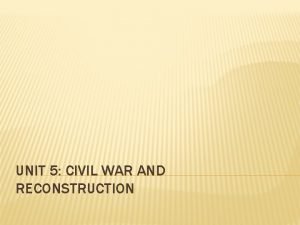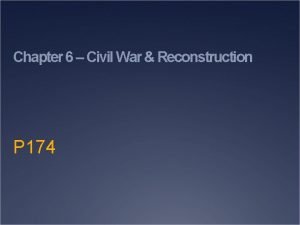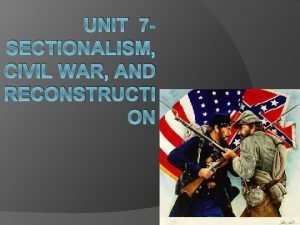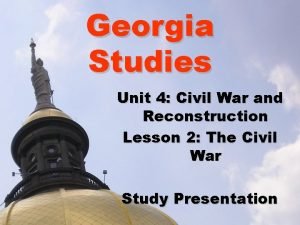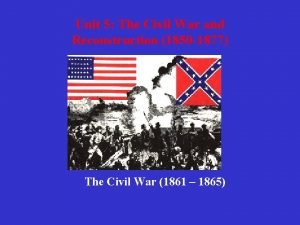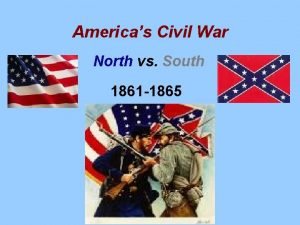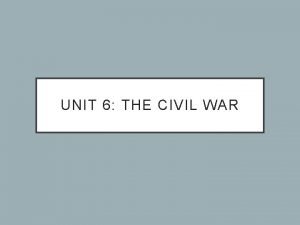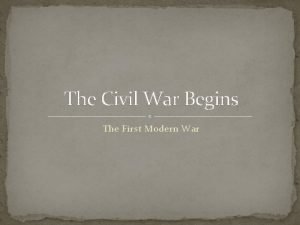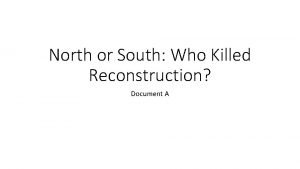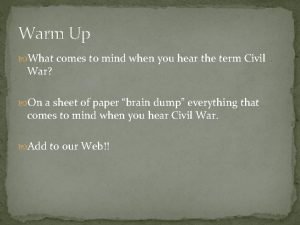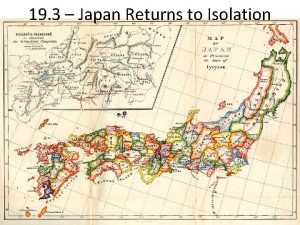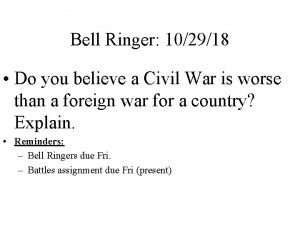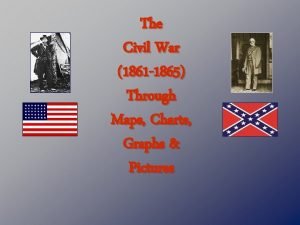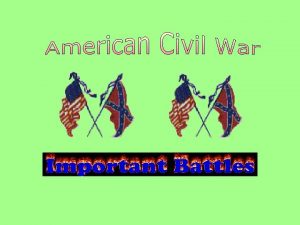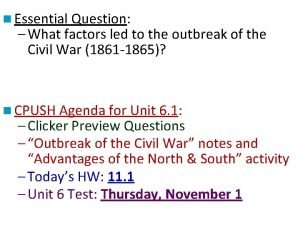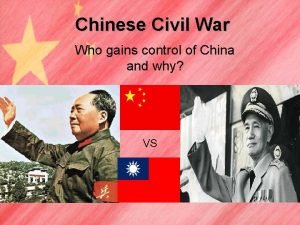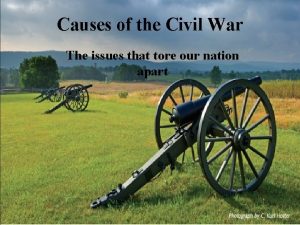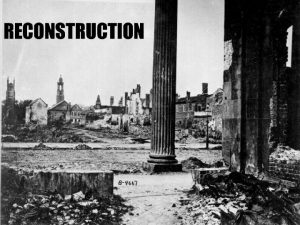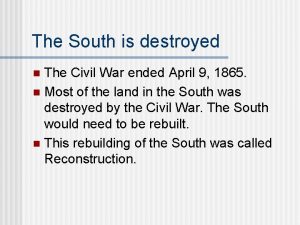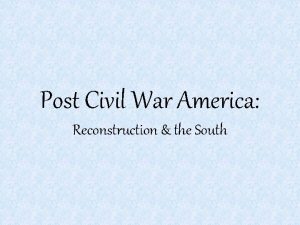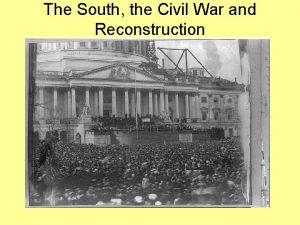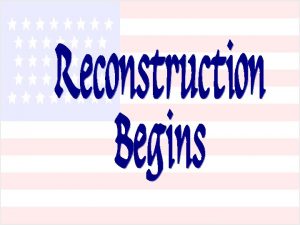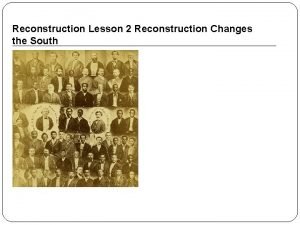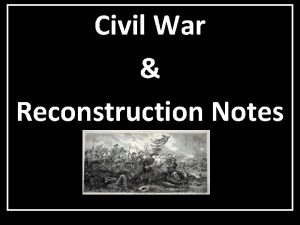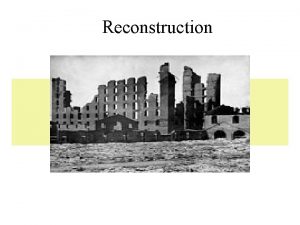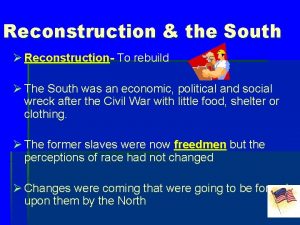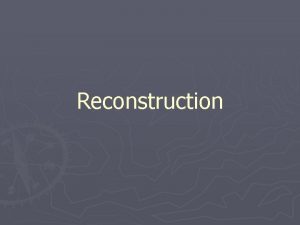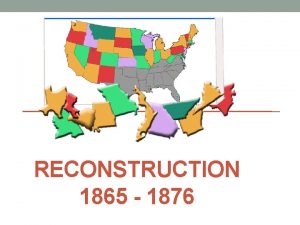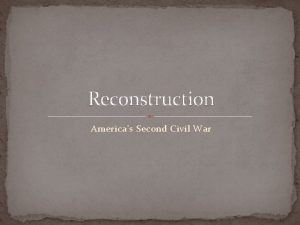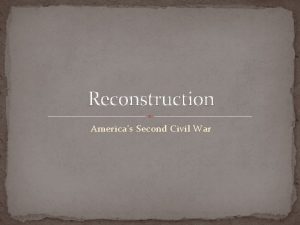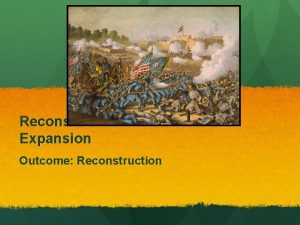Reconstruction The South is destroyed The Civil War


























- Slides: 26

Reconstruction

The South is destroyed The Civil War ended April 9, 1865. n Most of the land in the South was destroyed by the Civil War. The South would need to be rebuilt. n This rebuilding of the South was called Reconstruction. n

Reconstruction Plan President Lincoln wanted to reunite the nation as quickly as possible. n Any southern state with at least 10% of its voters making a pledge to be loyal to the U. S. could be readmitted to the Union. n The South also had to accept a ban on slavery. n


The Slaves Are Free With the ending of the war, the slaves were now free. n The 13 th Amendment to the Constitution was passed. n The 13 th Amendment made slavery illegal forever in the United States. n

The Freedmen’s Bureau was established to help poor blacks and whites in the South. n Laws against educating slaves during the Civil War meant that most ex-slaves did not know how to read and write. n

The Freedmen’s Bureau n n n Established schools and hospitals Provided food, housing, medical aid, legal assistance Helped freed slaves find jobs

Lincoln’s Second Inaugural Address On March 4, 1865, President Lincoln laid out his approach to Reconstruction in his second inaugural address. n He hoped to reunite the nation and its people. n

Lincoln is assassinated Just six days after the war ended, on April 15, 1865, President Abraham Lincoln was assassinated while watching a play. n Lincoln was assassinated by John Wilkes Booth, a Southerner who was angry at Lincoln. n Vice-President Andrew Johnson became president. n

The Black Codes were laws passed by Southern states that limited the newfound freedom of African Americans. n Black Codes forced African Americans to work on farms or as servants. They also prevented African Americans from owning guns, holding public meetings, or renting property in cities. n

Voting Rights Other laws were passed to keep blacks from voting. n One law said former slaves had to pay a tax to vote. It was called a poll tax. n

Radical Republicans n n n The Black Codes angered many Republicans in Congress who felt the South was returning to its old ways. The Radical Republicans wanted the South to change more before they could be readmitted to the Union. They were angry at President Johnson for letting the South off so easy.

Johnson and The Radical Republicans Congress was angry at President Johnson for not going along with their Reconstruction policies. n As a result, Congress impeached Johnson. n

Impeachment is the process of charging a public official with a crime. n The next step was to try the President in the Senate. n By a single vote, Republicans failed to convict Johnson. n

Scalawags White Southerners that supported Reconstruction and the new way of life. n They were not well liked by people in the South. They were viewed as traitors. n They were usually non-slaveholding whites. n

Carpetbaggers Northerners who moved to the South after the Civil War in hopes of making a profit. n The got their name because they didn’t come down south with much- only a satchel (or “carpetbag”) of possessions. n They were not well liked because Southerners thought they were taking advantage of their situation. n

The 14 th Amendment n The 14 th Amendment guaranteed citizenship to all people born in the U. S. .

15 th Amendment In 1870 the 15 th Amendment became law. n The 15 th Amendment gave African American men the right to vote. n Women’s rights activists were angry because the amendment did not also grant women the right to vote. n

Reconstruction Amendments n The 13 th, 14 th, and 15 th Amendments to the Constitution are known as The Reconstruction Amendments.

Sharecropping In the South, many white landowners needed workers, and many former slaves were trying to seek economic independence. n Black families ended up renting small portions of land in return for a small portion of their crop (given to the landowner each season). n

Did this work? No! African Americans worked their land, and were forced to give a portion of their crop to the landowner. n They ended owing more than they could pay because they had to pay for the use of tools and other supplies. n Slavery was replaced by Sharecropping. n

Ku Klux Klan n n In 1866 a group of white southerners created the Ku Klux Klan. The KKK was a secret society opposed to African Americans obtaining civil rights, particularly the right to vote. The KKK used violence and intimidation to frighten blacks. Klan members wore white robes and hoods to hide their identities. The Klan was known to have murdered many people.

Segregation and Jim Crow Laws Starting in 1881, blacks had to stay in separate hotels, sit in separate parts of theaters, ride in separate rail cars, and have separate schools, libraries, and parks. This is known as segregation. n Segregation - the legal separation of blacks and whites in public places n Jim Crow Laws - laws that forced segregation n

40 Acres and Mule n n Remember all that land Sherman seized? What happened to it? During Reconstruction, ex-slaves were promised 40 acres of land a mule. President Johnson gave the land that was given to the former slaves back to the original owners. They were told they could either sign work contracts with the white owners or leave. Those that refused were forced out by army troops.

Successes of Reconstruction Restored the US as a unified nation n 13 th, 14 th, 15 th Amendments were passed n Public School System Formed n

Failures of Reconstruction n n Rights of African Americans were limited because of Black Codes & Jim Crow Laws Sharecropping kept former slaves tied to rich white landowners Freedmen’s Bureau did not last long enough to make a lasting impact (it was defunded by President Johnson) Economy of the South suffered
 Unit 5 civil war and reconstruction
Unit 5 civil war and reconstruction Chapter 6 civil war and reconstruction
Chapter 6 civil war and reconstruction Civil war and reconstruction achieve 3000 answer key
Civil war and reconstruction achieve 3000 answer key Unit 4: civil war and reconstruction
Unit 4: civil war and reconstruction Unit 5 civil war and reconstruction
Unit 5 civil war and reconstruction Civil war and reconstruction study guide
Civil war and reconstruction study guide North vs south civil war
North vs south civil war North and south states civil war
North and south states civil war North and south states civil war
North and south states civil war Causes of civil war
Causes of civil war Civil war first modern war
Civil war first modern war Toward civil war lesson 3 secession and war
Toward civil war lesson 3 secession and war Who killed reconstruction north or south
Who killed reconstruction north or south Civil rights and civil liberties webquest
Civil rights and civil liberties webquest English civil war mind map
English civil war mind map Japan civil war 1467
Japan civil war 1467 Civil war bell ringers
Civil war bell ringers Civil war 1861/1862
Civil war 1861/1862 Civil war resumes
Civil war resumes Guernica
Guernica Mississippi civil war sites map
Mississippi civil war sites map Civil war advantages and disadvantages chart
Civil war advantages and disadvantages chart Who
Who English civil war timeline
English civil war timeline Civil war vocabulary list
Civil war vocabulary list Civil war readers theater
Civil war readers theater What were the 4 main causes of the civil war
What were the 4 main causes of the civil war
